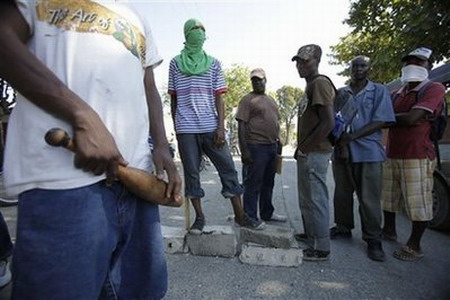Asia-Pacific
Outside Haiti capital, much despair, little aid
(Agencies)
Updated: 2010-01-17 11:31
 |
Large Medium Small |
|
 Men, holding wood and metal objects, protest at the entrance of the town of Leogane January 16, 2010.?[Agencies] |
LEOGANE, Haiti: As aid masses in Haiti's devastated capital, time is running out in rural areas where the damage is no less severe. In Leogane, frustrated men gathered Saturday with machetes and clubs, ready to fight for a town they said the world has forgotten.
All along the cracked highway heading west from Port-au-Prince along the bay, people begged for help. "SOS," declared a sign near Leogane. "We don't understand why everything is going to Port-au-Prince, because Leogane was broken too."
That is putting it lightly.
At the corner of Rue La Croix and Pere Thevenot, a charming two-story built in 1922 that housed a pharmacy and a florist last week is a brickyard sepulcher for the couple who died trying to escape.
Blocks away a group of men gathered to defend a health clinic-turned-shelter against all comers: The local government, which wants to dig another mass grave there, criminals loosed from the capital's broken penitentiary, and looters as hungry as they are.
They said they do not want violence, but carried machetes, typical of this sugar-growing town, and clutched wooden pins and poles.
"There is no one in the police station. We haven't seen aid," said 28-year-old Philip Pierre, who manages a yogurt plant. "We are ready to die fighting if they don't listen to us."
Death has done brisk business here already, in a town where roaming Carnival bands were just getting in gear when the quake struck Tuesday, its epicenter just 12 miles (25 kms) to the east.
The stench emanating from rubble is intense, and among the residents' demands are the "big shovels" working in the capital to excavate bodies.
In a charitable move, casket-maker Yvon Lochard put his wares on sale, dropping the price of a wooden coffin from $450 to $100.
"Before business was slow," he said matter-of-factly. "Now I'm selling these quickly."
Even Lochard's prices, however, are too steep for most in a country where half the population lives on $1 a day. They carry their bodies atop pieces of tin and drop them in a mass grave.
The living, meanwhile, are trying hard to stay that way. There is food in the markets, but the price of a 50-pound bag of rice has risen about 25 percent to $27.50 since the quake struck. In the mountains that ring the town, cisterns broke, leaving many without drinking water.
A nearly collapsed corner store had $6,000 worth of rice, spaghetti and other food in the basement, its owner said, but he was too scared of collapse to go in and get it, despite increasingly terse demands from neighbors that he do so.
U.N. peacekeepers from Sri Lanka were delivering water to about 1,000 people and sharing their own rations, Maj. Chandima Beligasooabba said. They were told the U.N. would be bringing in food supplies later Saturday.
A team from Kansas City, Missouri-based Crisis Response International roamed the downtown area near the structurally unstable Sainte Croix Hospital, looking for any non-governmental organization to give supplies to. None was immediately apparent.
Within Leogane, individual neighborhoods are on the lookout against each other. Leaders of each suspect the others might get violent, but promise they won't start trouble themselves.
The first few protesters straggling into the streets were tense. One machete-wielding young man briefly collapsed from what his neighbors said was hypertension. And as the daze wears off from the shock wave that hit the town, older frustrations and the ordinary complications of Haitian life are creeping back in.
"If the international community gives the government money, we're going to take to the streets," 51-year-old Maximillian Alfred said. "They won't do anything with it for the community."












